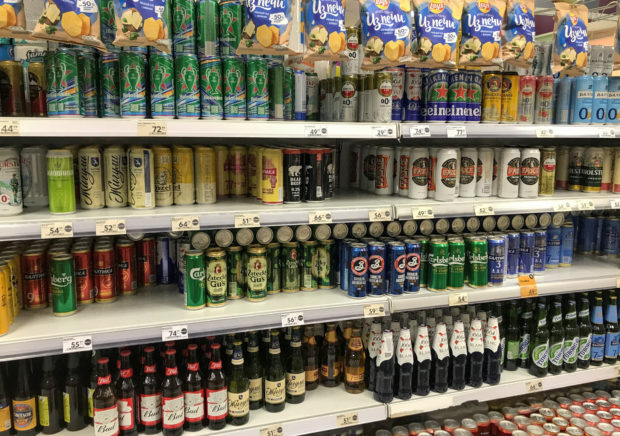Last orders? Foreign beers remain on Russian shelves months after brewers halt sales

A view shows shelves with cans and bottles of beer at a shop in Moscow, Russia July 20, 2022. REUTERS/Staff
MOSCOW — The last orders bell tolled for Bud, Carlsberg and Heineken beers in Russia in early March, but shops across Moscow are still selling off stockpiles months after the brewers said they would halt production.
The continued availability of unsold stacks of Carlsberg, Anheuser-Busch InBev and Heineken’s flagship brands underlines the difficulty Western brands have faced in withdrawing products in response to the conflict in Ukraine.
Their cans and bottles were still on sale in supermarkets and stores in Russia’s capital this week, a Reuters review found – an example of how long it can take consumer-focused sanctions or restrictions to have a significant impact.
It was not clear how much inventory Russian retailers have, but for now the supplies are helping to cushion the blow of the tough sanctions which prompted the world’s top brewers to turn off the taps to Russia’s most popular Western beers.
Carlsberg and Heineken said on March 9 they would stop production and sales of their flagship brands in Russia, joining an exodus of foreign companies after Moscow sent troops into Ukraine on Feb. 24, in what it calls its “special military operation”.
Two days later, AB InBev, which runs its Russia operations in a joint venture with Turkish brewer Anadolu Efes, said it had requested that the licence for production and sale of Bud in Russia be suspended.
Dates printed on the bottom of cans and bottles on sale in about half a dozen supermarkets in Moscow, including ones owned by the country’s biggest food retailer X5 and convenience chain Krasnoe & beloe (K&B), show that some production of all three beers continued in Russia after the brewers’ public announcements, in Carlsberg’s case for several weeks.
X5 did not comment and K&B did not respond.
Reuters identified Heineken cans with markings saying they were produced at a factory in St Petersburg on March 23 and Carlsberg cans on April 29 in Tula, a city south of Moscow.
Heineken said it sold out its own stock entirely soon after announcing that it would stop brewing Heineken in Russia.
“Our last brew of Heineken in Russia was in March, last packaging beginning of April and last sale second week of April,” the company said in emailed comments. “After that there was no Heineken being brewed or sold by Heineken in Russia.”
On March 28, Heineken announced its decision to leave Russia, seeking an orderly transfer of its business to a new owner and expecting to book related charges of around 400 million euros ($405.8 million), while guaranteeing the salaries of its 1,800 employees in Russia until the end of the year.
Not yet sold out
Also on March 28, Carlsberg, the Western brewer most exposed to Russia, said it would seek a full disposal of its Russia business which would result in a “substantial non-cash impairment charge” this year.
The company holds a 27% share of the local market through its ownership of the country’s biggest brewer, Baltika, and employs 8,400 people.
The brewer said it had “limited production” after March 9 using materials already produced and to fulfil obligations to customers.
Last production was in April, and it had since got rid of its remaining materials, the company added.
“Carlsberg will disappear from the shelves in Russia as stocks are being sold out,” it said in an email.
Reuters found cans of Bud with markings saying they had been produced in the Volga city of Ulyanovsk in late June.
AB InBev in April said it expected to take a $1.1 billion charge as a result of its plan to sell its non-controlling interest in the AB InBev Efes joint venture, with the suspension of the licence for production and sale of Bud in Russia also part of a future transaction.
“Active discussions continue between the parties regarding the sale of AB InBev’s non-controlling interest in the AB InBev Efes JV to Anadolu Efes,” AB InBev told Reuters.
Carlsberg, Heineken and the AB InBev joint venture command more than 60% of the Russian beer market, according to Promsvyazbank analysts. There was no suggestion that any of them had broken sanctions or their own public pledges.
The Russian Union of Brewers last week warned of packaging and labeling problems, saying that breweries were working at limited capacity. It has previously said Russian-owned firms face serious problems if supplies of hops, the vast majority of which are imported, are disrupted.
RELATED STORY: